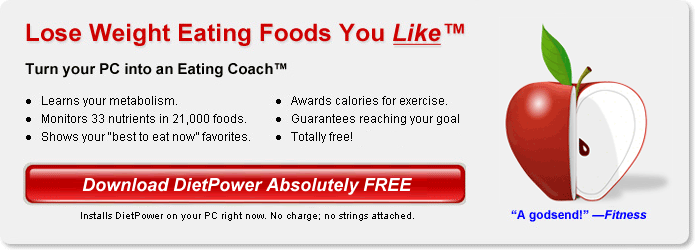Calorie Shifting: Does it Work?
By Terry Dunkle, DietPower Editor-in-Chief
 "Calorie shifting" (sometimes called the Zig Zag Diet) supposedly tricks your body into burning calories faster, so you can eat more food while still losing weight. Proponents argue that it can "melt away pounds" like magic. Some claim that calorie shifting can rev up your metabolism enough to burn off 20 pounds in 20 days.
"Calorie shifting" (sometimes called the Zig Zag Diet) supposedly tricks your body into burning calories faster, so you can eat more food while still losing weight. Proponents argue that it can "melt away pounds" like magic. Some claim that calorie shifting can rev up your metabolism enough to burn off 20 pounds in 20 days.
Almost all calorie shifters argue that calorie shifting is based on science. Here's their rationale:
Normally, when you lower your calorie intake to lose weight, your body reacts by going into "starvation mode"—expending fewer calories in order to resist the loss. As your metabolic rate drops, you must eat fewer and fewer calories to continue the loss. This makes you desperately hungry, and eventually you fall off the wagon, eating more calories. With your body having won the contest, your weight rises to "normal" again.
Conversely, when you binge—eating everything in sight—your body automatically speeds your metabolism, burning calories at a ferocious rate in order to prevent weight gain.
To fool your body into losing weight, you start by eating a low-calorie budget for several days—typically three or four. Then, just as your body begins to "panic," you reassure it by shifting to a high-calorie budget for just one day. The next day, you sneakily return to the low-calorie budget, and your body is none the wiser. If you keep repeating this four- or five-day cycle, you lose a lot of weight because your body "thinks" you need more calories than you're actually feeding it.
Is any of this true?
"Calorie shifting is an interesting concept," says Ann Coulston, a member of DietPower's scientific advisory board and an expert on carbohydrate and fat metabolism. "I don't think it 'turns on fat burning hormones,' as some proponents claim. "But we do know that a body starved of calories begins to use calories more efficiently, which enables it to maintain the same weight on less food. This has plenty of scientific support, going back several decades."
We don't know that temporary overeating can defeat this starvation reflex, however. Neither Coulston nor DietPower's research staff has found any large, well-controlled studies reported in peer-reviewed scientific journals that support the theory. (If you know of any relevant, high-quality studies, please
.)
("Another way to prevent your metabolism from slowing down is to get physical activity each day," Coulston observes. "Even 30 minutes brisk walking will help." For insight on this method, see "What's the Best Weight-Loss Exercise?")
A Tool for Calorie Shifting
 Although it has not yet won physiological proof, calorie shifting may offer a psychological advantage: A low-calorie diet may be more bearable if you know you can overeat every few days. And as long as the overeating doesn't raise your average calorie intake above your maintenance rate, you'll lose weight.
Although it has not yet won physiological proof, calorie shifting may offer a psychological advantage: A low-calorie diet may be more bearable if you know you can overeat every few days. And as long as the overeating doesn't raise your average calorie intake above your maintenance rate, you'll lose weight.
How can you be sure your overeating days don't overshadow your "good" days? One way is to log your meals in a free calorie-counting program called DietPower, produced by the publishers of this website and described in our advertisement at right. Installed on your PC, DietPower not only calculates the correct calorie budget for your goal weight and target date, but automatically adjusts the budget if it notices a change in your metabolic rate. The adjustment, usually only a few calories a day, keeps you tracking smoothly toward your goal.
To practice calorie shifting with DietPower, you obey the prescribed budget on most days, but occasionally violate it for a day. This causes DietPower to withdraw calories from your Calorie Bank, throwing your bank balance into the red. Then, for a few days, you eat less than your budget and the program gradually puts the uneaten calories back into the bank. When the balance goes into the black again, you start the cycle all over again. As long as you keep the balance within, say, 1000 calories of zero (neither too high nor too low), you should reach your goal weight on your target date.
For more information about DietPower's handling of your calorie budget, see "Weight Loss That Can't Fail" on the program's detail page.
To download a free copy of DietPower, click here.
To comment on this article, .




